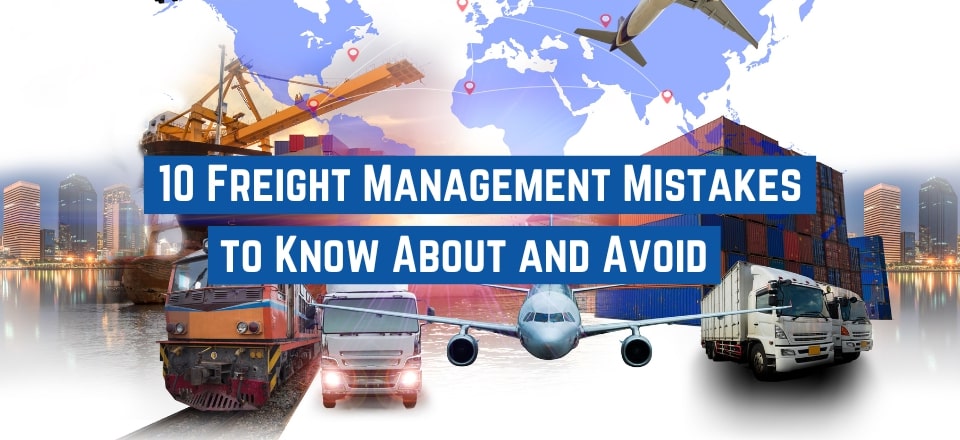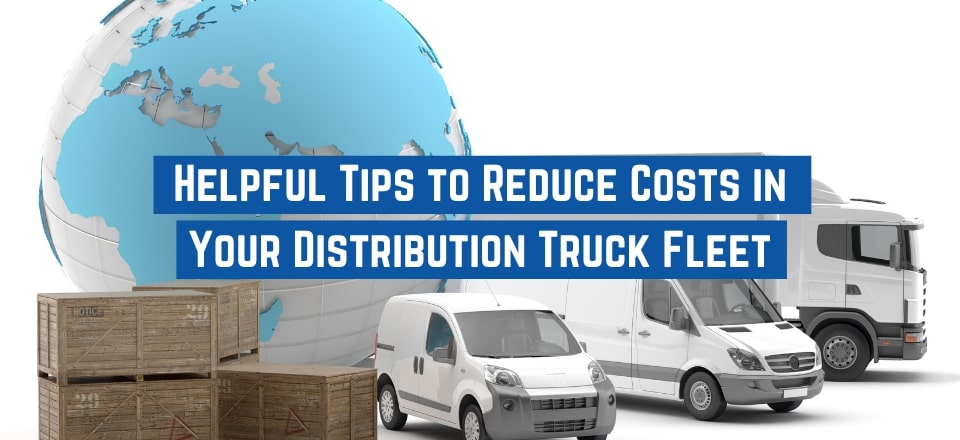Is your company one of the many that take a minimalist approach to freight management?
Yes… I did say minimalist, not lean.
When I say minimalist, I'm talking about the many companies which, while reliant on freight to keep supplies coming in and products going out, don't see freight management as a core competency. In many cases, quite rightly so.
But that view often results in an understaffed and undermanaged approach to supply chain operations.
That's the first big mistake I want to address in this article, after which I'll share information about ten other freight management mistakes we commonly see at Plumville while working with clients on supply chain improvement.
-
The Mistake of Minimalist Freight Management
So, what about this minimalist management issue? I'm talking about enterprises that leave their interactions with freight carriers to one or two people with little or no logistics knowledge or experience because freight and logistics are not core competencies. You know, the person who receives the retail store's inbound deliveries, the office administrator, or the guys and girls in the reception.
Why is it a mistake to leave freight management in the hands of people who are not logistics professionals and treat it as an unavoidable necessity for running your business?
The answer is that the approach could cost your company vast sums of money in unnecessary logistics costs. The wastage may even be so significant as to exceed the cost of employing a dedicated staff to handle freight management.
What Does it Take to Improve Freight Management?
Indeed, minimalist management often proves to be at the root of all the other freight management mistakes we'll outline in this article, since with no logistics professionals at the helm, attention even to the fundamentals, let alone the more advanced disciplines of freight management, is often painfully absent.
So, what are your options? It will typically be a choice between hiring logistics professionals, investing in relevant training and education for existing staff, or outsourcing your freight management activity.
To begin with, let's look at the last of the options mentioned above because companies often need to pay more attention to determining whether insourced or outsourced freight management is the better option.
-
The Mistake of Making No Insource/Outsource Decision
There is a link between this mistake and the one described above because, for most businesses with no dedicated freight management staff in-house, outsourcing would be a better option than minimalist management. However, the senior management team will only be aware of this if they take the time to evaluate the pros and cons of outsourcing versus in-house freight management.Potential Benefits of Outsourced Freight Management
For the company that's currently labouring along with minimal freight management, outsourcing can offer a range of potential benefits, including:
- Access to digital tools providing greater freight transportation efficiency and visibility
- Greater scalability for your supply chain and business
- Reduced logistics and freight costs
- Support from logistics professionals with mountains of freight management experience
- The advantage of the service provider's established partnerships/relationships with suppliers and other service providers
Of course, your analysis might determine that outsourcing freight management is NOT the right path for your company, but you will be wiser for having the answer. You must evaluate the option in detail to know if it presents more pros than cons or vice versa. -
The Mistake of Laissez-Faire Carrier Management
In our work with clients, we often encounter situations where a company works with far more freight carriers than necessary and makes no attempt to manage their performance or negotiate for better pricing.
Inevitably, when we start looking at these companies' freight challenges, we see a ton of inefficiency and freight costs bloated beyond all semblance of what is reasonable, along with a lack of reliability in the customer service offering.
In many cases, it's a scenario arising from the minimalist approach to freight management since, with no dedicated team to focus on logistics, there's nobody to plan, implement, or monitor elements of freight management such as the development of a standard carrier contract, programs of regular rate reviews and negotiations, and carrier performance management.
Without these checks and balances, companies tend to flit from carrier to carrier or use whichever one or two appear most convenient or economical. By neglecting or underestimating the need for meaningful analysis, they typically fail to attain anything like the value they might receive with effective carrier management.
Upgrading In-house Freight Management
What if you are determined to keep your company's freight management in-house and not outsource it? Then you'll need to establish a structured organisation comprising an appropriate number of logistics professionals to handle carrier relationships and performance measurement.
Such an organisation will support your graduation to more effective carrier procurement, which means consolidating your service providers to a manageable number, using only those that offer genuine value for your business.
At Plumville, our consultants have worked with client companies wishing to develop a solid freight management structure or that are struggling with the costs and complexities of setting up a dedicated logistics team.
We know it's often difficult to graduate from laissez-faire to proactive freight management. However, we also know how to help businesses get the most from the resources they have and make the right decisions for improvement.
So naturally, we're here to help your enterprise too. If you'd like to know more about how we can do that, we'll be delighted to hear from you.
-
The Mistake of Modal Fixation
While companies often use too many carriers, they sometimes go to the other extreme in choosing freight transportation modes. For example, a shipper might focus exclusively on ocean freight for frugality while underestimating the planning required to make it a cost-effective solution.
The adverse effects of such a mistake might include inventory availability issues during seasonal sales surges or in the event of an unforeseen shipping crisis, for instance.
Conversely, a fixation on the speed of air freight can lead a company to miss out on substantial savings attainable from the well-planned use of FCL or LCL ocean shipping or a balanced combination of ocean and air freight.
Similar mistakes are also commonplace in domestic freight strategies when overuse of a single mode, such as air or rail freight, generates cost or efficiency issues that could be alleviated with a more situational approach or even a route and mode optimisation program.
Once again, this lack of analysis or structure in freight mode selection protocols is a mistake that often arises when a company under-resources freight management activity. If you recognise the issue in your business, consider evaluating the possibilities of increasing your logistics team's strength or outsourcing freight management to a third party.
-
The Mistake of Spurning Digital Transportation Technology
Few corporate leaders today would deny that digital technology is essential for end-to-end supply chain management (SCM or ERP systems) or even for a specific logistics function such as warehousing (WMS). However, despite a proliferation of platforms available to support freight and transportation management, typically known as transportation management systems (TMS), the percentage of companies that use these solutions could be much higher. Indeed, a study completed last year shows that only around 26% of companies were using a transportation management system.
As recently as four or five years ago, the reason for the low adoption of TMS products would have been easier to understand. Back then, a company wishing to exploit the benefits of the software would have to procure a system, install, implement, and maintain it, making the cost prohibitive for many.
That obstacle no longer exists to such a great extent because developments in cloud technology have spawned a new way to adopt TMS. For example, if your business relies on freight shipping, you can partner with a service provider that will hook your company directly into its TMS solution.
The advantages of such partnerships are substantial because aside from providing automated freight and transportation management at an affordable price, the service providers typically have established relationships with hundreds of carriers and are digitally connected to many of them.
TMS: Is it the Same as Outsourcing?
Using a TMS service differs from outsourcing freight management, but you might want to think of it as a sort of halfway house.
Through a direct connection to the TMS platform, you retain control of your freight management while benefiting from the economies of scale and specialised expertise in logistics and related technology afforded by the service provider.
Is it unrealistic for your company to try consolidating its carrier portfolio? If so, a TMS service can be a real boon since it can connect you to a dense network of diverse carriers. In addition, TMS operators can often negotiate the best possible freight rates. Many providers will happily support you in maintaining your relationships with incumbent carriers and handle negotiations on your behalf, taking much work off your team's hands.
TMS: Keep Control of Your Carrier Options
Loss of control should not be a concern relating to TMS since you would switch interactions so that instead of talking directly with the carriers, you will have the same dialogue with the TMS provider, which would then act for you to help you meet your goals with each carrier.
So is it a mistake not to have TMS in your digital toolbox?
Well, it's not if you have made that decision after analysing the benefits and drawbacks. However, it would be a mistake to spurn the idea without due analysis because of pride, concerns about control or resources, or simple resistance to change, which are some of the typical obstacles that stop enterprises from working with TMS service providers.
-
The Mistake of Freight Invisibility
Nowadays, there is no need or excuse for any lack of end-to-end visibility in the supply chain. However, companies that use many carriers and lack strategic partnerships with digitally enabled service providers may still suffer visibility gaps.
These are the companies that still experience the need to phone or email carriers to check on the progress of freight and hence find it hard to provide frequent, timely updates for their customers.
That's just one of the reasons to establish partnerships with a few trusted carriers or freight forwarders, ensuring that, as part of their service, they can connect your business directly to their freight tracking solutions, enabling end-to-end visibility of all your shipments on demand and in real-time.
-
The Mistake of Inadequate Insight… and Foresight
While goods-in-transit transparency is a staple for effective freight management, it should not be the end game of freight visibility. The freight shipping environment can be volatile, and whoever is responsible for managing freight in your organisation must be familiar with it and all its nuances.
Are you currently leaving all your freight management to somebody who wears many hats or deals with logistics as a secondary responsibility? If so, they may not have the necessary chops to proactively manage things like rate forecasting and the response to changes in carrier capacity.
You must ensure you can plan for unexpected eventualities and anticipate potential issues. It's another good reason to have at least one or two knowledgeable logistics professionals involved in the freight management process.
-
The Mistake of Overlooking Freight as a Customer Service Enabler
While many companies today have changed their perception of the supply chain and see it for what it is—a critical piece of the customer service jigsaw, rather than a burdensome but necessary cost centre, there are still some organisations that overlook the importance of freight, and its shipping, to the customer experience.
Both inbound and outbound freight transportation, and its management, have a direct impact on customer service, even more so since the explosion in e-commerce changed the customer journey to one in which the cost and speed of delivery are critical.
With a minimalist approach to freight management, it will take much work to ensure that the people you charge with logistics responsibility see the big picture and how your freight shipping performance fits into it. As a result, you might miss opportunities to improve your company's competitive advantage through innovative freight management initiatives.
Improved Customer Service Can Reduce Your Costs
Even if you have a dedicated freight management team, avoiding the mistake of an uncoupled focus on logistics is vital. Try to refrain from letting a determination to slash costs become a distraction from the need to maintain customer satisfaction.
As we've revealed in other posts on this blog, our research uncovered a direct link between service improvement and cost reduction. If you focus on the former, you will likely achieve the latter.
So, keep your team focused on service, and task them with the quest for innovation. If you do this, you could enjoy freight management expense reductions over time, offsetting some of the costs of maintaining a dedicated team of logistics specialists.
If you'd like to learn more about the research results mentioned above, we'll be pleased to share our findings in more detail and explain how we could help your organisation use freight management to improve customer service.
-
The Mistake of Environmental Nonchalance
It's easy to assume that inbound and outbound freight logistics don't reconcile well with any drive for social responsibility or environmental friendliness. Yet, while it's true that freight shipping takes its toll on the environment and that, for now, there are few radical options for sustainability in the industry (electricity and other alternative fuels for land, sea, and air carriage are not yet mainstream solutions), it is possible and should be a primary goal, for your freight management approach to reduce the environmental impacts of your enterprise.Regardless of your paradigms relating to sustainability, there are more arguments for than against taking an environmentally responsible stance on your business activity. For one thing, more and more customers will consider your environmental policies and practices when choosing whether to support your business.
For another, a well-thought-out strategy for sustainable freight management can contribute to cost savings and service improvements, making it a win for the environment, a win for customer acquisition/retention, and a win for profitability—and what could be better than win-win, if not win-win-win?
What Makes a Sustainable Freight Management Strategy?
With a freight management strategy that favours the environment, you would be looking at ways, for example, to increase truck-space utilisation and reduce mileage in road freight, or to consider the best air or ocean freight options to minimise carbon footprint, and pursuing innovations to move your cargo in a way that helps to reduce environmental impact.
It would be a mistake in freight management to ignore the environmental issue, pay it lip service only, or underestimate the possibilities of embracing sustainability and benefiting from it. However, only with sufficient and correct resources to give the environmental impact of your freight operations their due attention can you hope to make meaningful inroads.
-
The Mistake of Underestimating Customer Expectations (Current & Future)
The ecommerce conflagration, fuelled further and faster by the COVID-19 pandemic, has forever changed what buyers, whether businesses or consumers, perceive as acceptable delivery performance.Not only do consumers often expect fast delivery, with receipt on the day of purchase becoming the norm, rather than the exception, but they also want it to be free of charge, or at least included in the price of the product, and not billable as an extra.
Only proactive and dedicated freight management can help businesses like yours meet these expectations and do so without excess cost to your enterprise. Muddling along with freight as an afterthought, assigned to the general back office or warehouse staff to take care of, may no longer cut it.
That's not to say it's not doable. Still, it's a risky gambit with more and more competitors grasping the criticality of a fast, responsive, and cost-effective approach to moving goods through the inbound and outbound supply chain.
The mistake here would be to underestimate how much customer satisfaction depends on effective freight management and the dedicated efforts necessary to achieve it. Furthermore, even if your customers are not currently expecting a superior level of logistics service to that which you can provide, it may only be a matter of time before they do.
Mistakes Made? It's Never Too Late to Fix Them!
In publishing this article, I hope to help you avoid the common freight management mistakes my team and I regularly encounter in our work with clients. It's possible, though, that your company, like many others, has already made some of them and that you are living with the consequences.
If so, don't fret! Mistakes are OK as long as a remedy follows at the earliest juncture, and they form part of a learning process.
Plumville specialises in helping companies improve freight management and many other critical elements of supply chain performance. So if you recognise the effects of any of the above mistakes in your organisation, we'll be pleased to help you eliminate them and raise your freight management game.
Why not get in touch with us? It's easy. You can even book a free consultation call with just a few clicks.


